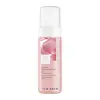What's inside
What's inside
 Benefits
Benefits

 Concerns
Concerns

 Ingredients Side-by-side
Ingredients Side-by-side

Water
Skin ConditioningSodium Laureth Sulfate
CleansingCocamidopropyl Betaine
CleansingGlycerin
HumectantPolyglyceryl-4 Caprate
EmulsifyingDecyl Glucoside
CleansingPhenoxyethanol
PreservativePanthenol
Skin ConditioningParfum
MaskingSodium Benzoate
MaskingCitric Acid
BufferingAllantoin
Skin ConditioningHydrolyzed Silk
HumectantTetrasodium Glutamate Diacetate
Butylene Glycol
HumectantSodium Hydroxide
BufferingCI 14700
Cosmetic Colorant
 Reviews
Reviews

Ingredients Explained
These ingredients are found in both products.
Ingredients higher up in an ingredient list are typically present in a larger amount.
Allantoin is a soothing ingredient known for its protective and moisturizingg properties. Because of this, it is often added to products with strong active ingredients.
Studies show higher concentrations of this ingredient can promote wound healing.
Though it can be derived from the comfrey plant, allantoin is produced synthetically for cosmetic products to ensure purity.
Learn more about AllantoinCitric Acid is an alpha hydroxy acid (AHA) naturally found in citrus fruits like oranges, lemons, and limes.
Like other AHAs, citric acid can exfoliate skin by breaking down the bonds that hold dead skin cells together. This helps reveal smoother and brighter skin underneath.
However, this exfoliating effect only happens at high concentrations (20%) which can be hard to find in cosmetic products.
Due to this, citric acid is usually included in small amounts as a pH adjuster. This helps keep products slightly more acidic and compatible with skin's natural pH.
In skincare formulas, citric acid can:
While it can provide some skin benefits, research shows lactic acid and glycolic acid are generally more effective and less irritating exfoliants.
Most citric acid used in skincare today is made by fermenting sugars (usually from molasses). This synthetic version is identical to the natural citrus form but easier to stabilize and use in formulations.
Read more about some other popular AHA's here:
Learn more about Citric AcidDecyl Glucoside is a glucose-based surfactant and emulsion stabilizer. It is created by reacting glucose with the fatty acids from plants.
Surfactants help clean the skin by trapping oil, sebum, and dirt to be washed away. As an emulsion stabilizer, it stabilizes the ingredients in a product by preventing them from separating.
This ingredient is biodegradable and non-toxic. This ingredient is commonly found in baby shampoos.
Decyl Glucoside is sometimes used to stabilize the UV filter Tinosorb.
Learn more about Decyl GlucosidePhenoxyethanol is a preservative that has germicide, antimicrobial, and aromatic properties. Studies show that phenoxyethanol can prevent microbial growth. By itself, it has a scent that is similar to that of a rose.
It's often used in formulations along with Caprylyl Glycol to preserve the shelf life of products.
Water. It's the most common cosmetic ingredient of all. You'll usually see it at the top of ingredient lists, meaning that it makes up the largest part of the product.
So why is it so popular? Water most often acts as a solvent - this means that it helps dissolve other ingredients into the formulation.
You'll also recognize water as that liquid we all need to stay alive. If you see this, drink a glass of water. Stay hydrated!
Learn more about Water